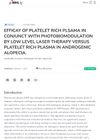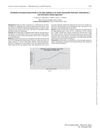 1 citations,
February 2010 in “Proceedings of SPIE”
1 citations,
February 2010 in “Proceedings of SPIE” Low level laser therapy may help regenerate hair cells in the ear after damage from gentamicin.
 1 citations,
January 2002 in “Journal of Clinical Dermatology”
1 citations,
January 2002 in “Journal of Clinical Dermatology” Low iron levels in the blood may be linked to chronic hair loss in women.
1 citations,
March 1995 in “Pharmacoepidemiology and drug safety” Taking oral contraceptives while on isotretinoin may increase the risk of high triglyceride and cholesterol levels.
 January 2025 in “Journal of Dermatological Treatment”
January 2025 in “Journal of Dermatological Treatment” Combining low-level laser therapy with minoxidil doesn't improve hair loss treatment compared to using minoxidil alone.
 December 2024 in “Asian Journal of Medical Sciences”
December 2024 in “Asian Journal of Medical Sciences” Low iron levels may be linked to hair loss in women with chronic telogen effluvium.
 October 2024 in “Dermatologic Surgery”
October 2024 in “Dermatologic Surgery” Low-level laser therapy helps increase hair density in androgenetic alopecia.
 September 2024 in “Research Square (Research Square)”
September 2024 in “Research Square (Research Square)” Low-level laser therapy effectively treats hair loss and promotes hair growth.
 July 2024 in “Medical Science Monitor”
July 2024 in “Medical Science Monitor” Women with type D personality and PCOS experience more stress and use less effective coping strategies.
 July 2024 in “Scholars Journal of Medical Case Reports”
July 2024 in “Scholars Journal of Medical Case Reports” Combining low-level laser therapy and exosome therapy promotes hair growth.

Low vitamin D3 and ferritin levels may cause hair loss in pregnant women.
June 2024 in “Cermin Dunia Kedokteran” Low level laser therapy is effective and safe for various skin and hair conditions.
 May 2024 in “Medical Journal Armed Forces India/MJAFI”
May 2024 in “Medical Journal Armed Forces India/MJAFI” Both low-level light therapy and 5% minoxidil are effective and safe for treating male hair loss, with no significant difference in results.
 April 2024 in “Journal of dermatology research reviews & reports”
April 2024 in “Journal of dermatology research reviews & reports” Using a laser helmet with Minoxidil works better for male hair loss than Minoxidil alone, with no extra side effects.

Low-level laser therapy may help uninfected cells but has different effects on coronavirus-infected cells.

Combining PRP with low-level laser therapy is better for hair growth than PRP alone.
 January 2024 in “Photodiagnosis and Photodynamic Therapy”
January 2024 in “Photodiagnosis and Photodynamic Therapy” Using minoxidil with laser therapy is more effective for female hair loss than minoxidil alone.
 January 2024 in “The Egyptian Journal of Hospital Medicine”
January 2024 in “The Egyptian Journal of Hospital Medicine” Men with male pattern baldness have higher levels of A-FABP, which might help in early detection.
 January 2024 in “The Egyptian Journal of Hospital Medicine (Print)”
January 2024 in “The Egyptian Journal of Hospital Medicine (Print)” Zinc levels are not directly linked to pattern hair loss.
 December 2023 in “Aggregate”
December 2023 in “Aggregate” Scientists are using clumps of special stem cells to improve organ repair.
 December 2023 in “International Journal of Molecular Sciences”
December 2023 in “International Journal of Molecular Sciences” Men with early balding showed higher levels of certain genes linked to hair loss and possibly prostate cancer.
 December 2023 in “Trials”
December 2023 in “Trials” The trial is testing if a helmet that uses light can prevent hair loss during chemotherapy.
 November 2023 in “Journal of medical and health studies”
November 2023 in “Journal of medical and health studies” Combining low-level laser therapy with scalp microneedling and a clobetasol solution significantly improves androgenetic alopecia.
 May 2023 in “Bali Medical Journal”
May 2023 in “Bali Medical Journal” Higher sebum levels are linked to more severe male baldness.
 March 2023 in “Journal of the turkish academy of dermatology”
March 2023 in “Journal of the turkish academy of dermatology” High levels of ceruloplasmin might indicate more severe toenail fungus.
 January 2023 in “Dermatologic Therapy”
January 2023 in “Dermatologic Therapy” A new hand-held light therapy device was found to be safe and effective for treating mild-to-moderate acne.
 December 2022 in “Medical lasers”
December 2022 in “Medical lasers” Low-level laser therapy may help with hair regrowth in alopecia areata but its effectiveness for psoriasis and atopic dermatitis needs more research.
 December 2022 in “Cureus”
December 2022 in “Cureus” Low iron levels are linked to hair loss in women.
 October 2022 in “Journal of advances in medicine and medical research”
October 2022 in “Journal of advances in medicine and medical research” Low-level laser therapy combined with NB-UVB is a safe and potentially effective treatment for stable vitiligo.
 October 2022 in “European heart journal”
October 2022 in “European heart journal” Higher stress levels were found about two weeks before a heart attack.
 October 2022 in “Benha Journal of Applied Sciences”
October 2022 in “Benha Journal of Applied Sciences” People with non-scarring hair loss have higher levels of DKK-1, a protein linked to hair growth, than those with scarring hair loss or no hair loss.



























